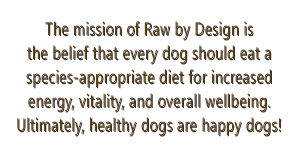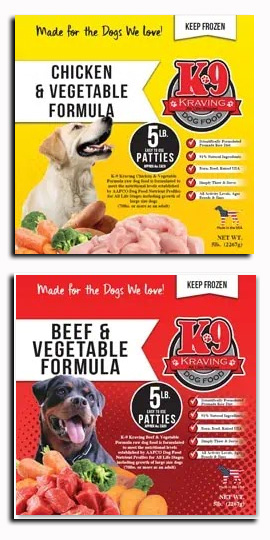|

|
|
631.350.2325 |
 |
 |
 |
|
Today : February 22, 2026 |
|
|
|
WHY RAW ? |
|


|
|
|
Benefits of a Raw Diet for Dogs
Improved Digestion: Raw diets typically contain natural enzymes and probiotics, aiding in digestion and reducing issues like bloating and gas.
Healthier Coat and Skin: The high-quality proteins and fats in raw diets can lead to shinier coats and healthier skin for your furry friend.
Enhanced Energy Levels: Dogs on raw diets often show increased energy levels and improved overall vitality, attributed to the nutrient-dense nature of raw foods.
Supports Dental Health: Chewing on raw bones and tougher meats can naturally help clean teeth and prevent plaque buildup, promoting better oral health for your pup.
What should dogs be eating?
Raw dog food is in line with what dogs are naturally meant to eat and offers a range of health advantages. Dogs are natural carnivores, and their diet should primarily consist of meat. It's crucial that this meat is raw. Animals don't cook their food, so your dog needs raw muscle meat, organs, fat, and bones.
|
| |
 |
|
What shouldn't dogs be eating?
Carbohydrates: While carbs can be beneficial for omnivores and herbivores, they don't provide the same nutritional benefits for carnivores as they do for others. Feeding your dog these foods if they can't properly digest and absorb the nutrients from them is pointless. Fruits and vegetables are not harmful; they're packed with essential nutrients. However, their quick digestion means dogs can't fully absorb the vital nutrients they need to stay healthy.
Cooked foods: Dogs are designed to eat raw foods. Their digestive systems, stomach acid, and bacteria-fighting enzymes are all geared towards handling these foods. Cooking destroys the vitamins, minerals, and enzymes necessary for their health.
Also, be cautious with cooked bones; they're more likely to break into sharp pieces, posing a risk to your dog. Dogs are meant to eat raw meat and bones.
Processed foods: These are unhealthy and not suitable for any animal. They offer little to no nutritional value. |
|
|
Dental advantages:
Dogs that eat commercial pet food often suffer from poor dental health. The starchy ingredients lead to tartar buildup and eventually dental disease. Dental disease in dogs is a serious issue that can result in abscessed roots and teeth needing extraction. Mouth infections can also occur, leading to more severe infections throughout the body. Additionally, any dental issues, from a simple tooth cleaning to a more complex dental procedure, are expensive and can be a financial strain for pet owners. To prevent dental problems in dogs on traditional pet food, it's important to provide proper dental care, including brushing their teeth, offering dental chews, and giving them recreational bones. To illustrate the negative impact of commercial diets on dental health, compare the dental condition of wild wolves and dogs. They don't need to brush their teeth to avoid tartar buildup, nor do they suffer from infections or other dental issues that require immediate attention. This is because they follow their natural diet. Your dog will have clean, white teeth when fed a raw diet. This maintenance is effortless for you. |
|

Dog with dental chew
|
|
| |
You won't have to spend money on fancy dental chews or brush your dog's teeth. You won't need to take them to the vet for costly dental treatments. How is this possible? Every time your dog chews, shreds, tears, and crunches on bones, they're getting a deep cleaning for their teeth. The act of chewing and grinding bones naturally removes plaque and tartar from the teeth.
Energy & vitality improves
While it's likely that the vast majority of dog owners don't have any issues with their dog's lack of energy and zest for life, many owners of dogs fed raw report that their pets have seen a significant improvement in energy and vitality after making the switch. They've observed that their dogs have more energy and even older dogs seem to act like puppies again.
Mental & physical exercise
Eating raw provides your dog with a substantial amount of mental stimulation and physical activity. The act of ripping, shredding, and tearing muscle meat, as well as crushing bones, exercises the jaw and neck muscles. Although they gain more energy overall, one of the best aspects of raw feeding is how dogs tend to tire easily after eating and seem content and ready to relax for a bit. This is due to the energy they expend while ripping, tearing, and crunching up complex pieces of meat.
In addition, you'll notice that your dog becomes more excited about meal times and enjoys their new diet more. This is because they're engaging in a very primal and instinctual activity. Chewing bones and tearing apart meat actually release endorphins in your pet. With the significant mental and physical exercise during meal times, dogs are more satisfied and less likely to engage in destructive behaviors out of boredom. |
| |

|
|
Stool improvements
A top perk of raw feeding is the change in the style of their dog's stools.
After successfully adopting a raw diet, your dog will eliminate less frequently. When they do have a bowel movement, it will be noticeably smaller. This is because your dog is actually digesting their food more efficiently and utilizing the nutrients better, resulting in less waste.
Furthermore, the consistency of your dog's stool will improve when fed a proper raw diet. Stools will be less smelly and softer. They will be firmer and odorless. The healthy stools of a raw-fed dog are quite solid and won't smear and create a mess when stepped on. When they dry, they turn white and crumble easily. This makes cleanup much easier and more enjoyable.
The healthy stools of a raw-fed dog are quickly deteriorating and don't spread and make a mess when accidentally stepped on. When they dry, they turn white and become crumbly. This makes cleanup so much easier and more comfortable.
Vet visits decrease
The main advantage of raw feeding is by far a healthier and happier dog. When dogs consume food that is biologically appropriate, they absorb all the nutrients from their food, making their immune system, digestive system, and other bodily functions stronger. This will benefit them over time as they will require less veterinary care and will be less prone to serious illnesses as they age. |
| |
|
|
|
| |
|
|
|
|
|